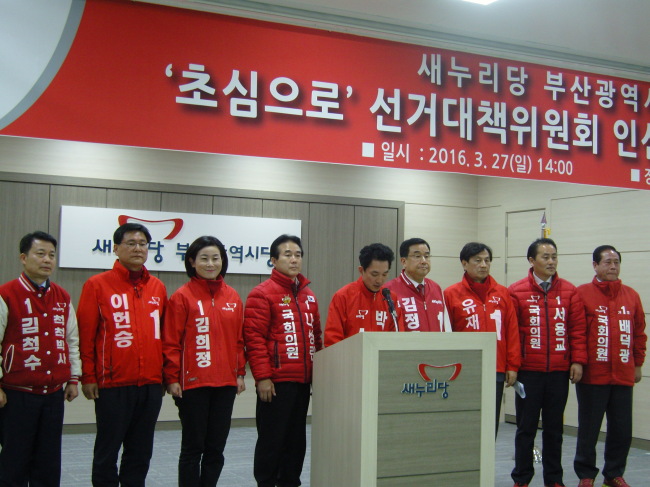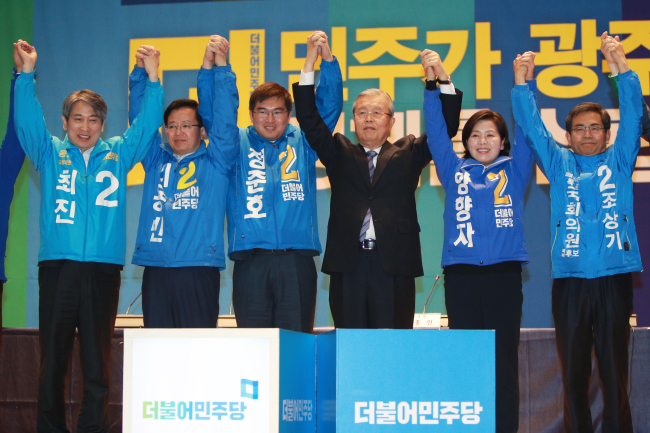With mere days left to the official election campaign period, mainstream parties are poised to elect this week the interim leadership tasked with spearheading the race leading to the April 13 parliamentary polls.
The ruling Saenuri Party and The Minjoo Party of Korea, both of which have been marred by factional strife over the candidate nominations, scrambled to win sufficient parliamentary seats and seize political momentum until the 2017 presidential race.
The Saenuri Party plans to announce Monday a collective leadership that includes factional big shots and a former cabinet member. Its leader Rep. Kim Moo-sung, whip Rep. Won Yoo-chul, Reps. Rhee In-jae and Seo Cheong-won and former finance minister Kang Bong-kyun would serve as cochairmen.
Faced with public pushback from the now-infamous clashes between the faction close to President Park Geun-hye and dissenters led by party leader Kim, the party renewed its pledge to recover its parliamentary majority. With the recent chain defections, the Saenuri currently holds 146 out of the 292 seats.
 |
| The Saenuri Party’s Busan office holds a convention to launch an organization tasked with leading the election campaign. Yonhap |
“Our future would be at stake if the Saenuri lost a majority (147 seats),” said party chief Kim, who had set the goal for the upcoming April elections as winning 180 or more seats, a number required for the party to pass contentious bills without negotiating a deal with opposition parties.
The Minjoo Party is expected to flock around interim leader Kim Chong-in, who will also lead solo the party’s election campaign. Kim has recently survived a leadership crisis over the proportional representation list, in which he had listed himself as a top-priority candidate.
Defining the upcoming elections as a “judgment” of what it viewed as “flawed” economic policies of the Park administration, the main opposition party is set to focus its election pledges and party platform upon economic issues.
While Kim publicly said that his goal is to keep the party’s current 107 seats, some key members suggested they could win up to 130 seats, if the opposition parties agreed to nominate a single candidate in battleground districts where several opposition candidates are set to compete with one another.
“Our goal is to win between 120 and 130 seats,” said the Minjoo Party’s former whip Rep. Woo Yoon-keun in a media interview. “(If we want to make it happen) we have to send a single candidate to constituencies such as Seoul and its neighboring cities.”
Out of the 253 seats elected through direct votes in constituencies, 178 seats were being contested between a single candidate from the ruling party and multiple candidates from the opposition parties. Among them, 105 seats were in Seoul and nearby metropolitan areas.
 |
| The Minjoo Party of Korea holds a convention at Gwangju to introduce its candidates to the voters. Yonhap |
But the prospect of building a coalition remains bleak as the minor opposition parties — the centrist People’s Party and the more progressive Justice Party — have refused to accept the offer, criticizing the Minjoo Party for “exploiting” its status as the main opposition during negotiation.
The Peoples’ party vowed to reprimand those candidates seeking to negotiate a deal without the approval of the party leadership. The 21-member party aims to win more than 20 seats, a number that allows the newborn party to secure government funding and exercise tie-breaking vote in the legislative process.
The Justice Party, which has been counting on building an opposition coalition, followed suit after the main opposition named its candidates in the constituencies of the minor party’s leader Rep. Shim Sang-jung and its whip Rep. Jeong Jin-hoo.
By Yeo Jun-suk (jasonyeo@heraldcorp.com)



